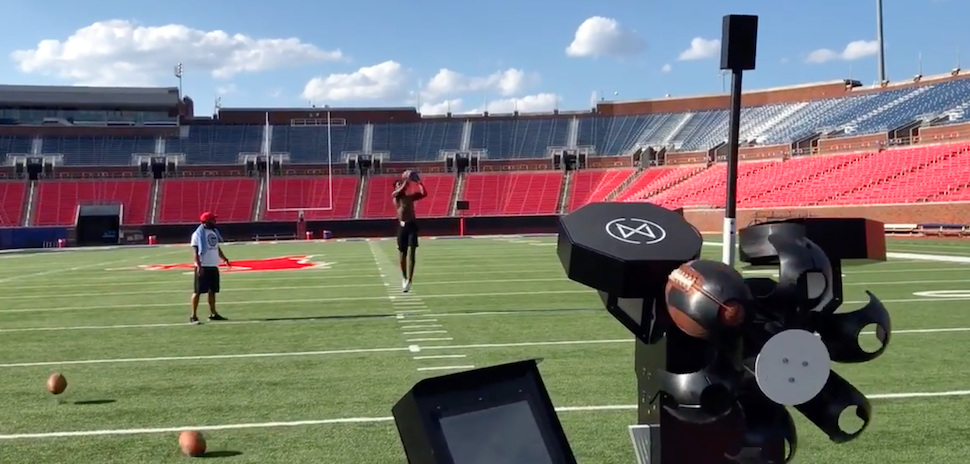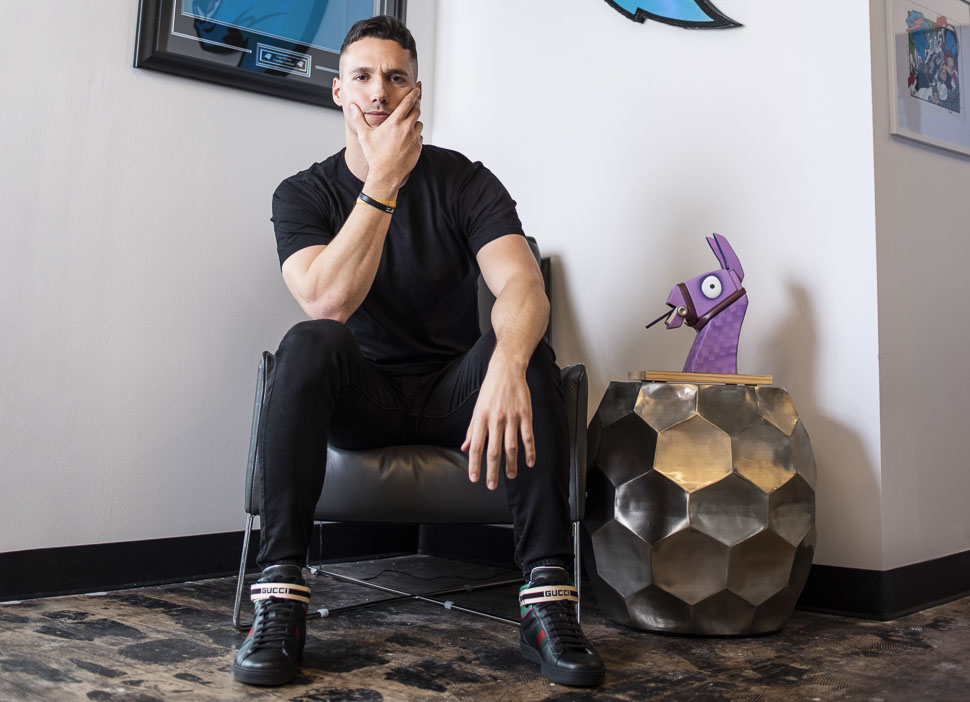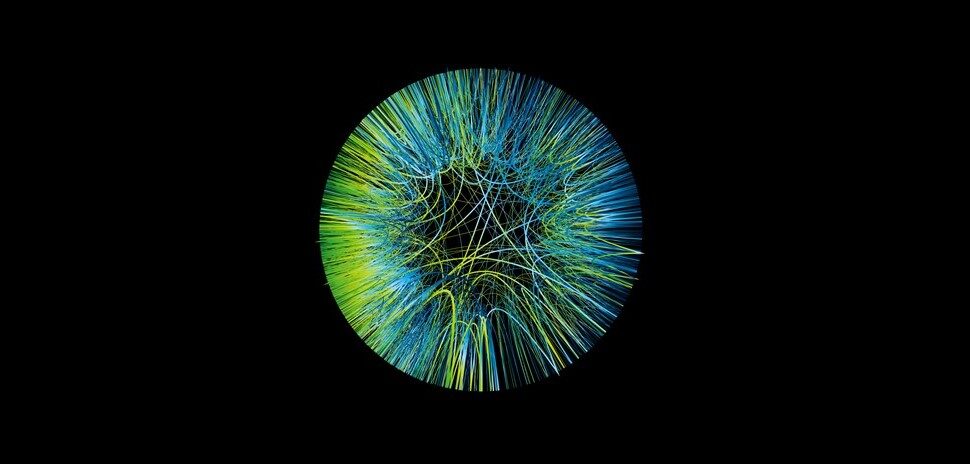Whether you’re shooting hoops, swinging at a tee, swimming laps, or throwing a ball against the wall, most sports have the tools and capabilities that allow you to practice all on your own—except football. Yes, there’s plenty of drills to run and exercises to sweat out, but if a wide receiver wants to perfect his catching, it typically requires another person.
And that’s where a new Dallas-based startup called Monarc is looking to enter the playing field.
The Seeker is the “world’s first robotic quarterback” that’s designed with every skill position in mind. The robot uses wearable technology and IoT to essentially become your own personal athletic trainer that throws perfect passes, every time.
If you’re picturing a JUGS Football Machine—which has been around for decades—you’ll notice The Seeker is similar. But, Monarc’s invention can be used solo.
“Any other piece of pitching machinery right now requires someone else to be present for it to fire. So our major innovation is that we can actually run in robotic mode, where it’s just the machine and a player,” Sawyer Theisen, Monarc’s director of sales, told Dallas Innovates. “They’re able to go run routes or catch kicks with no one else around. So it allows players to train autonomously for the first time ever.”
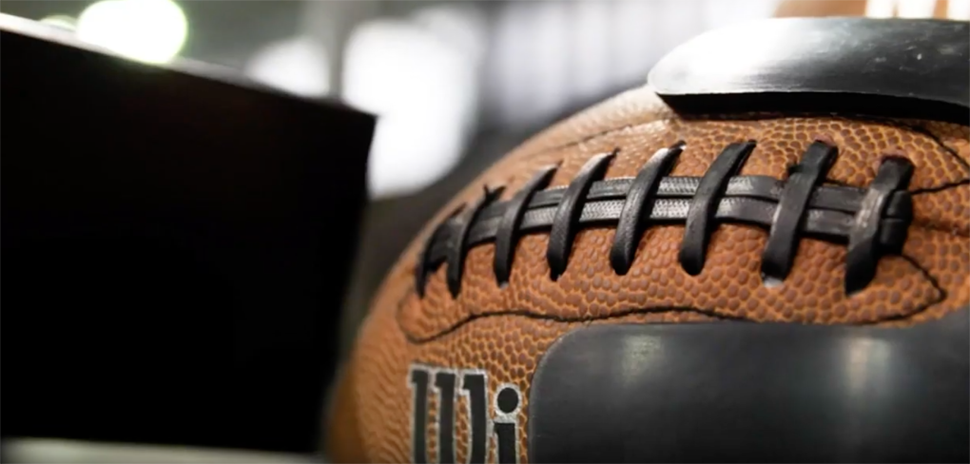
[Photo: via Monarc on YouTube]
Monarc is run by a group of six young men with an unlikely, roundabout story—and very little personal experience with football, despite it now dominating their lives.
The startup was co-founded by CEO Nate Pierotti, COO Igor Karlicic, and CFO Bhargav Maganti around three years ago. Pierotti’s roommate at the time was Karlicic boss’s son, and Karlicic and Maganti were roommates. Pierotti was best buddies with Theisen, and brought him on.
The idea was formulated, the company was founded, and then everyone else affiliated—Software Engineer Connor Early and John Kenny, who’s in sales—came onboard quickly.
“We’ve been working ever since,” Karlicic says. “We finally opened up our sales cycle about a month ago.”
The Monarc team did a number of tours across the country, stopping in various NFL and college stadiums and garnering some big names. “The feedback was ecstatic,” Maganti says. “Especially when you have players around. They just get giddy with excitement.”
Started from the bottom
The young men didn’t start in Dallas, but rather chose to make the move about a year ago. They say they have a “Silicon Valley”-esque personal journey, citing the charming HBO comedy series that follows a group of tech startup founders living together in a house they don’t own in the Bay Area.
The founding team bootstrapped for the first year and a half to two years. Together, they rented a house in Iowa City and worked out of the basement. The University of Iowa staff was integral throughout development, and opened a lot of metaphorical stadium doors when it came time to showcase across the U.S.
After bootstrapping, Monarc did its first seed round mostly backed by private investors, and raised $700K. It was then that the group collectively decided to move the company down to Dallas.

From left: John Kenny, Connor Early, Sawyer Theisen, Bhargav Maganti, and Igor Karlicic. [Photo: Selena Guerra]
“There’s nothing like high school football in Texas,” Maganti says, clearly alluding to Texas’ infamous “Friday Night Lights” reputation. “And the huge airport is big for our traveling needs.”
Karlicic notes the “incredible amount of energy” in Dallas when it comes to sports, especially football (hello, Dallas Cowboys country). A production facility Monarc uses is located in Grand Prairie, and when looking at places in the country that were expanding, the men noticed Texas was chief among them.
“When we were thinking about where our company headquarters would make sense, for our customers, for production, for business opportunities, and stuff relating to what we’re doing right now, but also past that, it was very decidedly Dallas,” Karlicic says.
Now, Monarc operates out of coworking space CENTRL Office on St. Paul Street.
And, some of the boys even still live together.
How it works
The Seeker is intended to get rid of the guess work, human error, and wasted time that comes with trying to get a ball where it needs to go when using a pitching machine. Six balls can be thrown at once, up to 65 miles per hour (the boys didn’t want to break any fingers).
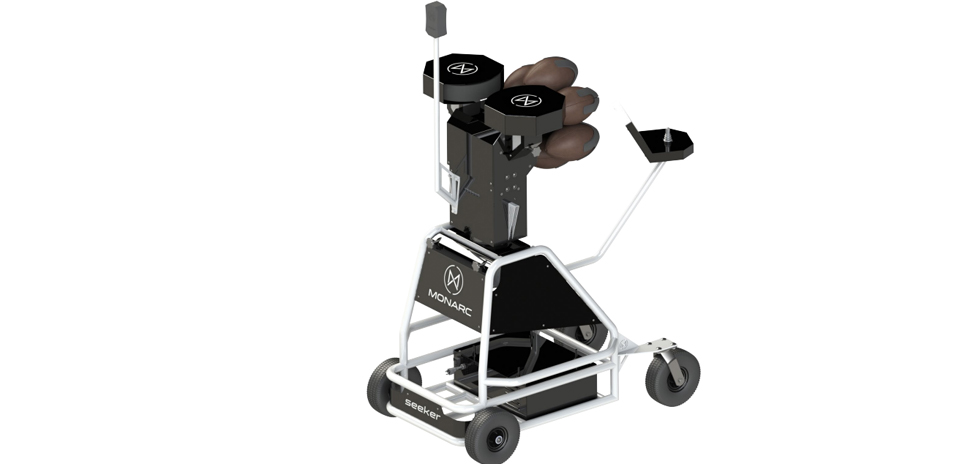
[Photo: Courtesy Monarc]
There’s a Stationary Gauntlet feature, which throws the footballs in rapid, randomized succession to warm-up the body. And, there’s two main modes: Robotic, which is player-centric for training alone, and Manual, to be used in practice to increase efficiency.
With the Robotic Mode, Monarc’s Pulse tracking tag is put on before multiple routes and drills that can be performed independently. The tag, worn on the hip, uses ultra wideband technology that enables Monarc to understand a person’s position 25-times a second in real-time. During a session, The Seeker is able to throw passes that anticipate where a person is going.
So, no matter how fast a player runs or what route they take, The Seeker’s end user experience is designed to modify to any situation.
“The major piece of innovation comes with this tag. As people are moving around, we have all sorts of data on them. And we have it immediately,” Karlicic, who’s a mechanical engineer with Maganti, explains. “We not only know where they are, but our algorithms predict where they’re going to be. And then we know where to throw, taking the time of flight of the ball into calculation. There’s a lot of stuff that we’ve solved over time.”
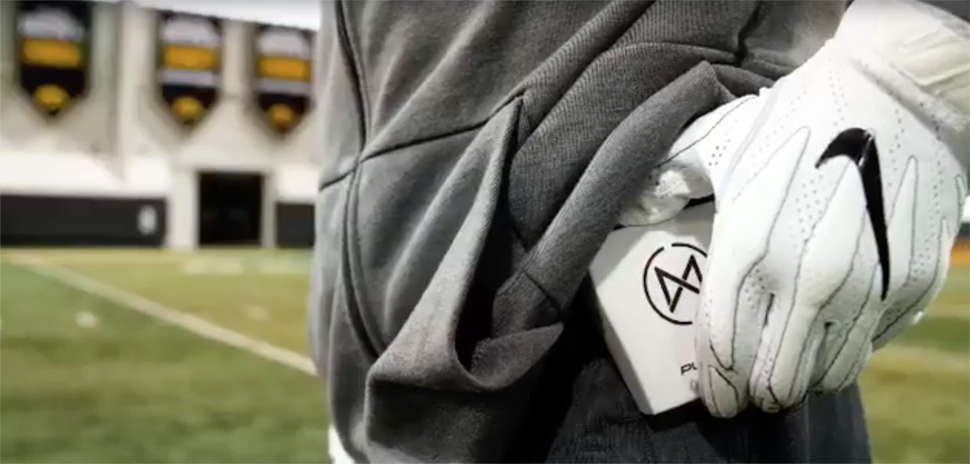
[Photo: via Monarc on YouTube]
With the Manual Mode, The Seeker’s built-in touchscreen and joystick comes into play. A virtual grid of the field is shown that allows a player to choose where they want the ball to go, and send it to that location every time. The machine makes any necessary adjustments.
The throw is similar to a current pitching machine on the market. Theisen says it’s for the “old school” players who like to line the ball up with their eyes, then you use the joystick to adjust it. It was an easy feature for the engineers to add; the Monarc team wanted The Seeker to have every component seen in current technology, “but better.”
“As far as the practice efficiency goes, The Seeker helps things go through the roof, and that’s what coaches love,” Theisen says. “It’s a pre- and post-practice drill. When receivers have a case of the drops, they can get assigned to catch 40 times after practice. And they usually require someone to feed them one ball at a time. So they’d be able to do that alone.”
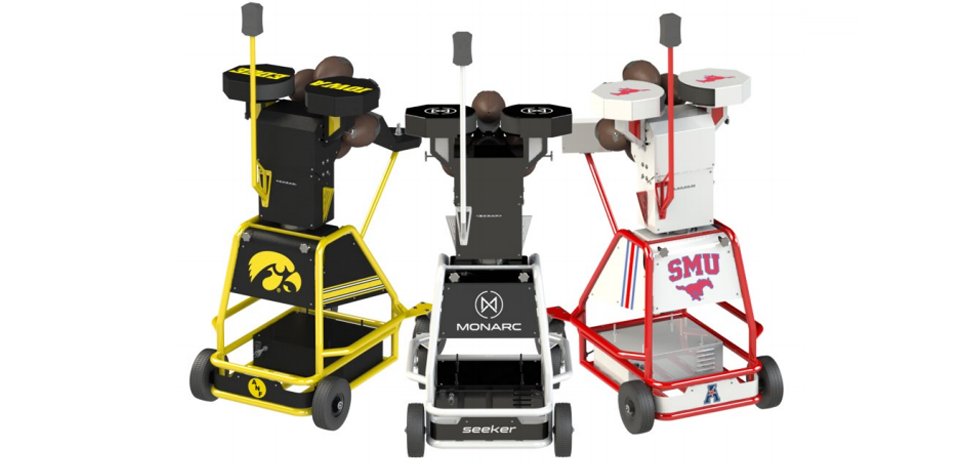
The Seeker is fully customizable. For example, the Monarc team drew up a mock design for Odell Beckham Jr. with his infamous catch, his college number and his NFL number, and his Twitter hashtag. [Photo: Courtesy Monarc]
The Seeker comes with 4G LTE connection for Monarc Connect, a mobile and web platform that allows coaches to track the usage of the machines. Maganti said its at the ground floor right now, but is similar to an iPhone, where software updates are easily downloaded.
“We’ll be able to send new drills and new applications remotely—we don’t have to be at their facility,” he says. “All they do is go in, download it, and they’ll have new drills and applications.”
There’s leaderboards for teams to breed in-house competition, and national leaderboards if a player wants to measure up to be the hardest working.
“You can track off-season accountability for the first time ever,” Theisen says. “We’ve had high schoolers use it, we’ve had everybody use it—it’s very, very simple. If you can operate a flip phone, you can figure this out.”
Monarc Connect even follows personal metrics, where a player would be able to evaluate their workout. Karlicic says the data aspect has so much clarity, the system is able to calculate things like effort value. So if a player is only running with 8 percent of their effort, breaking early, or taking too many steps, Monarc Connect will be able to tell.
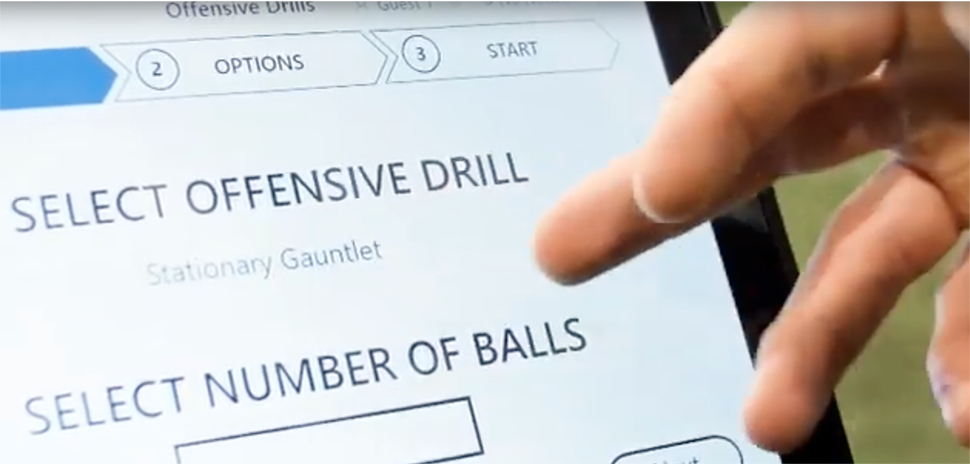
[Photo: via Monarc on YouTube]
“In Robotic Mode, each player would actually have a profile to let the machine know who’s using it, so all that usage data could go and be tracked by the coaches and by the players as well,” Karlicic says. “So they can objectively evaluate their workout. If you have areas that you struggle with, you’re able to work those specifically.”
The production model of The Seeker is currently in what the team thinks is the eighth or ninth iteration. They were granted a patent for a delivery system for targeted launching of sports projectile, which isn’t specific to football, and leaves room to expand in the future. Any sports projectile to a tracked player—a puck, disk, etc.—is covered by the patent domestically, and internationally for a year and a half.
“The combination of what we have with tracking and physical interaction, that’s something that can span past just football,” Karlicic says. “We’ve discussed other opportunities, but that’s really down the line once we nail this and get this to be ubiquitous in the entire sport. We have a lot of ideas, just because if you think about the tracking component, interacting with people, and the software capabilities, you can get lost in those conversations.”
In the meantime, the Monarc team is focused on making The Seeker the best product it can be. They’ve ironed out any kinks and advanced it to a state where it’s ready to begin production once sales are made.
Maganti says they currently have three verbal commitments. They’re just waiting for their stadium visits to turn into sales.
“We have a lot of positive feedback from everyone, but since it’s such a new product, people are looking for: ‘Has someone actually bought it?’ So we’re on the cusp.” Maganti says. “It’s a huge, close-knit community that they have. All the coaches know each other. So if one person says ‘I vouch for this’—everyone else is going to come on-board.”
The University of Iowa continues to be vital, and is even one of Monarc’s first customers. For now, it’s about getting The Seeker into the hands of every player in every league.
“Our goal at Monarc has always been to make an impact in the game of football,” Theisen says. “And the people who see it know that we’re going to achieve that goal. Once you see a demo, it’s pretty clear that it’s the future of football.”
On Thursday, June 20, Monarc is having a demo and happy hour at CENTRL Office to show-off The Seeker. You can find out more info here.
![]()
Get on the list.
Dallas Innovates, every day.
Sign up to keep your eye on what’s new and next in Dallas-Fort Worth, every day.










